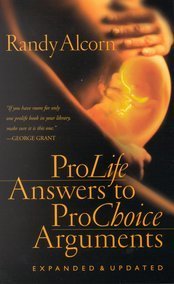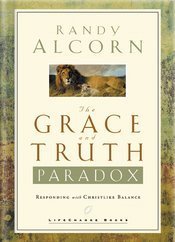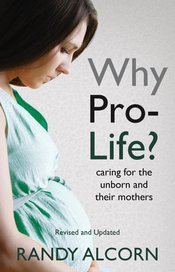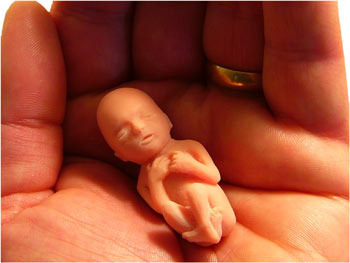Randy Alcorn's Blog, page 203
January 18, 2013
Every Life Is Precious, No Matter How It Was Conceived
 In addressing the issue of abortion in the case of rape in my book ProLife Answers to ProChoice Arguments, I pose a series of questions to readers:
In addressing the issue of abortion in the case of rape in my book ProLife Answers to ProChoice Arguments, I pose a series of questions to readers:
What if you found that your spouse or adopted child was fathered by a rapist? Would it change your view of their worth? Would you love them any less? If not, why should we view the innocent unborn child any differently?
On a television program about abortion, I heard a man say of a child conceived by rape, “Anything of this nature has no rights because it’s the product of rape.” But how is the nature of this child different from that of any other child?
And why is it that pro-choice advocates are always saying the unborn child is really the mother’s, not the father’s, until she is raped—then suddenly the child is viewed as the father’s, not the mother’s?
The point is not how a child was conceived but that he was conceived. He is not a despicable “product of rape.” He is a unique and wonderful creation of God.
Last year I shared a story on my blog about a 94-year-old woman who was reunited with her 77-year-old daughter who was conceived by rape. It was a powerful reminder of how a child conceived by rape is as precious as a child conceived by love, because a child is a child.
I came across the following story in Indivisible: Restoring Faith, Family, and Freedom Before It’s Too Late by James Robison and Jay W. Richards. James, founder of LIFE Outreach International, shares his own story of being conceived by rape:
A Testimony to Life
As important as abortion is in politics, it also can be a painful personal issue. Several years ago, I (James) interviewed a guest on Life Today who had become pregnant as the result of rape. At first, she was so horrified by what had happened to her that abortion seemed her only option. She felt as if having the baby would be an ongoing reminder of her experience. Later, when she heard a song titled “A Baby’s Prayer” by Kathy Troccoli, she felt the need to pray. And as she prayed, she realized that the “little mass of tissue” in her womb was really a person with purpose and potential. She decided to keep the baby and named her Alexis Kathleen in honor of Kathy Troccoli, whose song had touched her heart and caused her to reconsider her options.
As this young woman told her story on our show, I began to weep because I also am the product of rape. My mother was an unmarried, forty-year-old practical nurse who was sexually assaulted by the alcoholic son of the man for whom she was caring. When she went to the doctor to have me aborted—because she had no husband, an inadequate income for caring for a child, and had been raped—the doctor said, “Ma’am, I simply do not believe this is best. I believe it is wrong.” My mother later told me she went home, sat down alone, and prayed. And God said, “Have this little baby, and it will bring joy to the world.”
My mother chose to carry me to term, and I was born in the charity ward of the Saint Joseph Hospital in Houston, Texas. Two weeks later, through an ad in the newspaper, my mother released me to a foster family, who raised me for the first five years of my life. My conception was the result of a crime, and my childhood and adolescence weren’t easy, but God had a plan for this unexpected child born in difficult circumstances.
In standing against abortion, we don’t want to minimize the trauma of an unexpected pregnancy—especially by rape or incest. But if we affirm the value of every life even in the tough cases, God will honor the intent of our hearts and use that choice in a way that we can’t imagine beforehand. Both of us have been blessed because a mother in a desperate situation chose life. We both have a child by adoption and can’t imagine life without them. Randy Robison is now forty-two, married with four beautiful children. Ellie Richards was adopted from China. She’s eight and already thinks she should rule the world.

January 16, 2013
Some Thoughts on Les Misérables
 I love the redemptive message of Les Misérables, from book, to stage, to screen. It reminds me of the song “Amazing Grace,” because it is deeply loved even by those who don’t fully believe its message. The beauty of the story is so great that even those who don’t believe in God, his grace and forgiveness and his ability to transform a man, still love it. This suggests that deep inside, being God’s image-bearers, part of them resonates with the gospel message which is portrayed, even if imperfectly, in Les Misérables.
I love the redemptive message of Les Misérables, from book, to stage, to screen. It reminds me of the song “Amazing Grace,” because it is deeply loved even by those who don’t fully believe its message. The beauty of the story is so great that even those who don’t believe in God, his grace and forgiveness and his ability to transform a man, still love it. This suggests that deep inside, being God’s image-bearers, part of them resonates with the gospel message which is portrayed, even if imperfectly, in Les Misérables.
I’ve seen three movies based on Les Mis, including the new musical, and I am still hearing in my head Anne Hathaway singing “I Dreamed a Dream.” Here’s some of that song in the movie trailer of the 2012 December release. It doesn’t have the power of Hathaway’s facial expressions in the movie, or the benefit of the context, but if you’ve seen it, it will take you back. It just took me back enough to start crying again:
 I can’t recommend the movie for young people because of the explicitness of the portion dealing with prostitution, but I am grateful that it shows the desperation and ugliness of that degrading vocation, instead of romanticizing it like Hollywood so often does. In some ways I preferred the 1998 movie with Liam Neeson as Jean Valjean. As a non-musical, it lacked the memorable songs of the new movie, but it also lacked the unmemorable ones, and I felt some aspects of the story were stronger. Still, both are great movies.
I can’t recommend the movie for young people because of the explicitness of the portion dealing with prostitution, but I am grateful that it shows the desperation and ugliness of that degrading vocation, instead of romanticizing it like Hollywood so often does. In some ways I preferred the 1998 movie with Liam Neeson as Jean Valjean. As a non-musical, it lacked the memorable songs of the new movie, but it also lacked the unmemorable ones, and I felt some aspects of the story were stronger. Still, both are great movies.
Victor Hugo’s masterpiece has been powerfully rendered again and again. There is much to celebrate in it, though of course like any human work, it’s not theologically infallible. Some points in it lend themselves to misinterpretation, especially related to the character Javert. I applaud Joe Rigney, in his Desiring God blog, for holding the drama in respect, while probing into a few issues that thoughtful believers will want to consider:
‘Les Misérables’ and the Law of God
By Joe Rigney
Victor Hugo’s Les Misérables is again a topic of conversation, and for good reason.
Christians, in particular, have rightly celebrated the portrayal of the beauty of mercy and grace in this moving 150-year-old tale. Most of the theological analyses have contrasted Javert, the law-obsessed Inspector, with Valjean, the grace-transformed thief.
And while much of this analysis has been spot-on, it’s important that a central biblical and theological reality not get lost. Let me put it this way: Many people regard Javert as the consummate legalist, the embodiment of a single-minded preoccupation with perfect obedience to God’s righteous Law. The problem is this: he’s not.

January 14, 2013
Perspectives on Louie Giglio, the Homosexual Issue and What It Means to Be a Christ-Follower in This Culture
 Because of his efforts to end human slavery, Louie Giglio was asked to pray at the Presidential inauguration. Louie said, “Though the president and I do not agree on every issue, we have fashioned a friendship around common goals and ideals, most notably, ending slavery in all its forms.”
Because of his efforts to end human slavery, Louie Giglio was asked to pray at the Presidential inauguration. Louie said, “Though the president and I do not agree on every issue, we have fashioned a friendship around common goals and ideals, most notably, ending slavery in all its forms.”
Last Thursday the internet exploded with the Louie Giglio “scandal.” What was this outrageous revelation? An eighteen-year-old recording of a sermon Louie preached. His sermon actually shows that—wait for it—this Christian pastor believed and taught what the Bible has said, and virtually all Christians have believed, for two thousand years.
Because of this sermon, a homosexual advocacy group protested his place in the inaugural lineup.
After conversations with the White House, Louie withdrew. He said, “It is likely that my participation, and the prayer I would offer, will be dwarfed by those seeking to make their agenda a focal point of the inauguration.”
As I listened to the message, I was struck by the gentleness and kindness of Louie Giglio’s words intended to invite in, not push away, those of homosexual orientation. He offered love and forgiveness for homosexual sin just as for heterosexual sin and every other sin. Giglio was careful to say that people with a homosexual orientation were loved and welcome in his church. Yes, the agenda of homosexual advocates was warned against, and that’s an appropriate warning. But there was no homophobia, no revulsion against homosexuals as individuals. Rather, Louie spoke with both grace and truth.
This 54-minute message is biblically clear yet careful and balanced, saying that homosexual behavior is one of many sins, and we should not hold it out as unacceptable while our personally preferred sins are ignored. It was a good sermon then, and in my opinion, still is.
If this message is “hate speech,” as it is called by some responders, then the Bible is hate speech, and no one can preach the whole Bible without being guilty of hate speech. Some people believe that and are honest enough to say it.
Following Louie’s withdrawal, the White House, via the Presidential Inaugural Committee, said,
We were not aware of Pastor Giglio’s past comments at the time of his selection and they don’t reflect our desire to celebrate the strength and diversity of our country at this Inaugural. Pastor Giglio was asked to deliver the benediction in large part for his leadership in combating human trafficking around the world. As we now work to select someone to deliver the benediction, we will ensure their beliefs reflect this administration’s vision of inclusion and acceptance for all Americans.
In other words, the administration will find someone to replace Giglio as the token religious figure in the program (it is difficult to ask an atheist to give the benediction). Presumably this will be a “Christian” who does not actually believe what the Bible says—indeed, if he or she did, he would likely be outed for it. At very least, it must be someone who does not have sufficient conviction or courage to have ever said in public what the Bible says about various moral issues.
 While Louie Giglio and I haven’t spent a lot of time together, the two times we have talked in person have been rich. In these conversations I saw the Giglios’ depth of love for Christ, for the gospel and for the welfare of others. They have dedicated their lives to serving our King and loving all. It’s hard for me to think of more genuine and caring people.
While Louie Giglio and I haven’t spent a lot of time together, the two times we have talked in person have been rich. In these conversations I saw the Giglios’ depth of love for Christ, for the gospel and for the welfare of others. They have dedicated their lives to serving our King and loving all. It’s hard for me to think of more genuine and caring people.
Several mainstream news articles and many comments express outrage that Louie preached what the Bible teaches. The level of hostility was sometimes off the charts. What I heard said about my brother in these forums does not even faintly resemble who he really is, either in private or in public, or for that matter, what he actually said in the context of his message.
If Louie Giglio, despite his people-loving track record, is viewed as a bigot because he believes and teaches the Bible, then it’s guaranteed you and I will be seen as bigots. Unless, of course, we either outright deny the Scriptures or are so quiet about our belief in them that no one finds us out. (Imagine an ambassador who lives in fear of divulging his King’s policies.)
Many of the articles and comments concerning Louie Giglio reflected this perplexing idea that good Christians must NOT believe the Bible. And, indeed, many professing Christians agree with Jesus only when he speaks about love. When he takes moral stands and says there’s an eternal hell to punish sins, that’s a different story. They take a cut and paste approach to the Bible—when I like what it says I’ll quote it, when I don’t like it, I’ll ignore, reinterpret or deny it. That means the Bible is not my authority. Rather, this culture is my authority. I am my authority.
Once we deny parts of God’s truth, then we are no longer under Scripture’s authority. We are winging it. And if Christians try to be relevant and accepted by making up truth on the fly, then the Jesus we speak of will not be the Scripture-believing Jesus of the Bible who was full of both grace and truth. He will just be the “loving Jesus” remade in our culture’s image, in which we redefine love as tolerance.
Among the comments, I discovered some Christians who seem astonished that the world opposes many Christian beliefs. Of course we will be mocked and despised—the Bible promises us that. Jesus said “A servant is not greater than his master. If they persecuted me, they will also persecute you” (John 15:20). He said, “In the world you will have tribulation” (John 16:33). Paul said, “all who desire to live a godly life in Christ Jesus will be persecuted” (2 Timothy 3:12). Peter said, “Dear friends, do not be surprised at the painful trial you are suffering, as though something strange were happening to you” (1 Peter 4:12).
If we are not opposed for our allegiance to the gospel, isn’t it because we are not living and proclaiming the gospel?
That’s why I get it when homosexual advocates and the world in general don’t believe the Bible or are hostile toward people who do. What surprised me was the shock displayed over a Christian pastor who actually believed the Bible. And actually preached what it says. (Isn’t that what true Christian pastors are supposed to do?)
I saw comments in which several people spoke up in Louie’s defense, but then said, essentially, “Someone shouldn’t be judged for what he’s believed and said nearly twenty years ago. He’s probably changed his mind and we should forgive him. Let’s give him a chance.”
But of course, for Louie to change his position would require him to repent of what the Bible teaches. It’s one thing to say “I was wrong,” it’s another to say, “God was wrong.” To do this, he would not be a Christ-follower in the historic sense. (True Christ-followers don’t deny God’s Word, they lovingly affirm it.) It’s one thing, years later, to say you would phrase some things a bit differently; it’s another to deny what the Bible actually says.
 Trying to fly under the radar of our culture on moral issues is no better than the always-in-your-face method. The grace-only approach, in the end, is as deficient as the truth-only approach. Jesus came full of both grace and truth (John 1:17). So should we.
Trying to fly under the radar of our culture on moral issues is no better than the always-in-your-face method. The grace-only approach, in the end, is as deficient as the truth-only approach. Jesus came full of both grace and truth (John 1:17). So should we.
It concerns me when those who profess to be Christians simply redefine what it means to be a Christian to accommodate whatever the culture currently believes. They oppose Giglio, they suppose, because they are more loving, kind and relevant Christians.
We live in a strange new world in which those who believe in historic Christian morality, who affirm what nearly all Christians everywhere have believed for two thousand years, are now seen as immoral bigots. Those who affirm as moral what has been biblically and historically immoral—including homosexual and heterosexual relations outside marriage—are now seen as taking the moral high ground. They are the people of virtue, since the central virtue is tolerance. People have always committed immorality. There’s nothing new about that. But there was a time when many who did so knew they should repent even when they didn’t. Today, people affirm and preach and celebrate immorality. And they insist that others must acknowledge the legitimacy of their beliefs, or be labeled bigots.
The only way to redeem yourself as a Christian in the eyes of popular culture is to deny what it means to be a Christian. The only way to be a credible pastor is to deny what it means to be a credible pastor. A tolerant culture will not tolerate your Christian beliefs. But, if you recant those beliefs, it might forgive you, in the same way it might forgive former racists.
To be bad is now to be good. To be good is now to be bad.
I see people repeating the often-said and very misleading “Jesus never spoke against homosexuality [or abortion].” Well, not by name, but he also never spoke directly against most sins. Show me what Jesus said about rape, wife-beating, child-molesting, child pornography, arson, torture, forgery or hundreds of other sins.
The truth is that Jesus condemned lust, both heterosexual and homosexual (Matthew 5:28). And in Matthew 19:9 Jesus condemned “porneia,” a broad word that covers all sexual sins condemned in the Old Testament, and others not addressed there. Greek scholars say this includes prostitution, bestiality, incest, child molesting, homosexual relations, and all heterosexual relations outside of marriage.
So Jesus really did speak against homosexual relations without using that exact term. Furthermore, Jesus repeatedly affirmed his belief in the Old Testament Scriptures. He said, “truly I say to you, until heaven and earth pass away, not the smallest letter or stroke shall pass from the Law until all is accomplished" (Matthew 5:18); “The Scripture cannot be broken," (John 10:35); and “Your word is truth" (John 17:17).
So even if you don’t accept that porneia includes homosexual relations, it’s inescapable that Jesus affirmed the same Old Testament Scriptures that consistently condemn homosexual actions along with heterosexual sins of every variety (Genesis 19:5-8; Leviticus 18:22-23; 20:13). Likewise, Jesus’ apostles, who wrote the God-breathed New Testament Scriptures, consistently spoke against homosexual behavior right along with other sins (Romans 1:26-27; 1 Corinthians 6:9; 1 Timothy 1:9-10; Jude 7).
Does this mean we can’t be empathetic and caring about those with a homosexual orientation or who have chosen that lifestyle? Of course not. If someone were outing me on this issue, they could go to my response to a “Lesbian Christian” who argued it’s okay for her to have a sexual partner. Like anything I wrote years ago I would no doubt make minor revisions on it today. But do I think I was hateful, bigoted, unloving and uncaring in what I said to her? I do not. In fact, I’m convinced I was speaking in her best interests, with heartfelt love.
 Too many Christians labor to airbrush Jesus and the Bible, to make them as attractive as possible. In doing so we distort both the Living Word, Jesus, and the Written Word, the Bible. We redefine sin, and minimize it in a misguided attempt to win people by saying what they’d rather hear.
Too many Christians labor to airbrush Jesus and the Bible, to make them as attractive as possible. In doing so we distort both the Living Word, Jesus, and the Written Word, the Bible. We redefine sin, and minimize it in a misguided attempt to win people by saying what they’d rather hear.
What bothered me most as I read dozens and dozens of comments was seeing professing Christians distance themselves from Louie Giglio. These new kind of “Christians” are a mirror image of this culture, craving popularity and acceptance. If that’s you, please understand—and I am trying to be honest, not cruel—that you bear no resemblance to what it has meant for two thousand years to be a true follower of Christ. Believe what you choose to, but please, in the interests of accuracy, stop calling yourself a Christian.
Our job is not to be God’s speechwriters and revise his words on his behalf, but to speak his words humbly. Our job is not to be God’s PR team, but to be his ambassadors, not making policy but simply representing what God has declared to be true.
This episode, I believe, points out the futility of trying to reach the world through being acceptable to the world. If you spent any time with the Giglios, you’d probably think that they are better, nicer and kinder than you are. So if Louie Giglio’s efforts against human slavery haven’t delivered him from moral outrage, your works and mine won’t deliver us. (We should do those works, of course, but out of love for God and people, not to be popular.)
Ask yourself whether you are living for the approval of this culture, or the Audience of One. Ask yourself, “In the end whose judgment seat will I stand before?” The homosexual advocate’s? The White House’s? The news media’s? The social media’s? The church’s? Or will we stand before God’s throne, where His “opinion” (truth), as expressed in Scripture, ultimately will be non-negotiable.
Christ’s followers are full of grace and truth. They are both loving and holy. Make no mistake—an unholy world will never be won to Christ by an unholy church.

P.S. If you’re interested in more perspectives on the “Giglio controversy,” this resource points to eight treatments by different believers.
Photo credit for Bible: Chris Yarzab via photopin cc
January 11, 2013
How Significant is Our National Debt, and What Are Its Implications?
I have pointed out before that one thing Republican and Democratic administrations have in common is their apparent unwillingness to do what it takes to balance our budget.
Look at what the Lord told Israel:
“…in the land the Lord your God is giving you to possess as your inheritance, he will richly bless you, if only you fully obey the Lord your God and are careful to follow all these commands I am giving you today. For the Lord your God will bless you as he has promised, and you will lend to many nations but will borrow from none. You will rule over many nations but none will rule over you” (Deuteronomy 15:4-6).
So lending is part of being blessed. What’s involved in being cursed?
“The foreigners who reside among you will rise above you higher and higher, but you will sink lower and lower. They will lend to you, but you will not lend to them. They will be the head, but you will be the tail” (Deuteronomy 28:43-44).
“Some were saying, ‘We and our sons and daughters are numerous; in order for us to eat and stay alive, we must get grain.’ Others were saying, ‘We are mortgaging our fields, our vineyards and our homes to get grain during the famine.’ Still others were saying, ‘We have had to borrow money to pay the king’s tax on our fields and vineyards. Although we are of the same flesh and blood as our fellow Jews and though our children are as good as theirs, yet we have to subject our sons and daughters to slavery. Some of our daughters have already been enslaved, but we are powerless, because our fields and our vineyards belong to others’” (Nehemiah 5:2-5).
This post from Lorne Blackman has some insightful thoughts about America’s debt:
A Biblical Perspective on National Debt
by Lorne Blackman
For 30 years I have watched with astonishment as our nation has sunk ever deeper into debt, even during times of peace and prosperity. A long, sorry procession of so-called “debt ceilings,” pay-as-you-go rules, and balanced budget proposals have all failed miserably, with each being promptly discarded the moment it threatens to actually reduce spending.
Today, having achieved the shameful distinction of world’s greatest debtor nation, we project massive trillion dollar federal deficits to continue indefinitely. Yet every effort to trim deficits, even by just a few percent, generates a national political crisis. Our president ignores the recommendations of his own debt commission. To Washington politicians and the media, “deficit reduction” now means annually accruing massive additional debt forever, just at slightly less than this year’s unprecedented rate of $1.6 trillion.
We wonder why this is allowed to continue. A socialist president? An irresponsible Congress? Greedy special interests? Too many on the federal dole? Yes to all of the above. But the truth is that political efforts to control debt fail because chronic deficits are not merely a political problem. They represent a spiritual problem.
A recent survey revealed that maintaining current levels of government benefits was far more important to Americans than controlling the growth of the debt problem. It seems we have reached a grave turning point in our national character, one which our Founders predicted would spell the end of liberty as we have known it: Americans crave security and entitlements more than they love liberty. We covet benefits for which we have not labored. We elect representatives who mock their Constitutional oaths by dishonoring the very principles they swear to uphold. Our lust for entitlements and our shameful envy of centralized European systems have produced a massive, uncontrollable bureaucracy that enslaves the people with debt, regulation, and intergenerational social dependency. And yet we seek ever more federal intervention—in health care, in foreign conflicts, in bank bailouts, in corporate bailouts, in state government bailouts.
The corrupting influence of federal plunder has rendered us a nation of competing interest groups: retirees, farmers, minorities, the rich, the poor, local governments, public employee unions, corporations, global interventionists, and multitudes of so-called “charities” and corrupt “health care” and “community” organizations. The federal government has degenerated into the agent of these plunder groups which take whatever they can by means of congress, the executive, or the courts. We have become a nation of hypocrites, extolling our compassion for the children as we lay up for them a heritage of perpetual debt, taxation and insolvency.
Our self-destructive behavior poses fundamental questions: Have government giveaways irreparably corrupted the character of the people? Has the Great Experiment failed? Can Americans, addicted to entitlements and laden with debt, still legitimately be considered a free and self-governing people?
Someone sent me this video. It isn’t an exciting narration, but I would be interested if anyone, of any political persuasion, can refute the claims made in this video. I honestly hope you can.

Photo credits
balance scale: Sepehr Ehsani via photopin cc | debit tokens: photo credit: msaari via photopin cc | money and credit card: StockMonkeys.com via photopin cc
January 9, 2013
Why Pro-Life?: Addressing the Defining Issue of Our Age
My book Why Pro-Life? was first published in 2004. With 300,000 English copies in print, and translations in 18 other languages, I have been amazed at its far-reaching impact. We’ve heard many heart-warming stories about lives touched by the book, such as this one:
Your book on abortion, Why Pro-Life?, helped me find the courage to talk to a friend and keep her from having one. I spent so much time praying for her to turn around and come to a life of purity. She read your book and asked me why it was such a big deal to me and I was able to bring her closer to Christ. —M.L.
 But in the eight years since the book was first written, technology has changed, statistics have become dated, and there are new resources, stories, and discussions. It was time for a thorough update and revision. With the help of others, I have gone over every sentence in the book, revising and updating. Hardly a paragraph of the original has remained unedited, and much new material has been added. The changes are so substantial that the revision is 50% larger than the original. I’m pleased to say that although I believe the original was a good book, the expanded and updated version is a better one. Those who read the original will find much more to think about and to use.
But in the eight years since the book was first written, technology has changed, statistics have become dated, and there are new resources, stories, and discussions. It was time for a thorough update and revision. With the help of others, I have gone over every sentence in the book, revising and updating. Hardly a paragraph of the original has remained unedited, and much new material has been added. The changes are so substantial that the revision is 50% larger than the original. I’m pleased to say that although I believe the original was a good book, the expanded and updated version is a better one. Those who read the original will find much more to think about and to use.
Why address the issue of abortion in the first place? Because abortion, the defining issue of our age, is America’s most frequently performed surgery on women. The Guttmacher Institute, a polling agency for the abortion industry, reports that four out of every ten pregnancies are ended by abortion.[i] Virtually every family, at some level, has been touched by abortion.
The stakes in this issue are extraordinarily high. If the pro-choice position is correct, the freedom to choose abortion is a basic civil right. If the pro-life position is correct, human casualties from the 3,315 surgical abortions occurring in America every day (not even counting chemical abortions, some of them from contraceptives) total more than all lives lost in the September 11, 2001, destruction of the World Trade Center.
 A recent Gallup poll indicated 27 percent of Americans say they are very strongly pro-choice, while 22 percent say they are very strongly pro-life. Taken together, that means 49 percent of Americans hold a strong view on abortion, either for or against.[ii] The other 51 percent are not as firm in their opinions. However, even these “uncertain” mostly believe that “abortion is morally wrong” and 39 percent of them favor restrictions in all but a select few circumstances. Hence, the majority of Americans still value life and can still be influenced in their thinking about abortion.
A recent Gallup poll indicated 27 percent of Americans say they are very strongly pro-choice, while 22 percent say they are very strongly pro-life. Taken together, that means 49 percent of Americans hold a strong view on abortion, either for or against.[ii] The other 51 percent are not as firm in their opinions. However, even these “uncertain” mostly believe that “abortion is morally wrong” and 39 percent of them favor restrictions in all but a select few circumstances. Hence, the majority of Americans still value life and can still be influenced in their thinking about abortion.
One thing is certain: If abortion really does kill children and harm women, then there’s too much at stake to remain silent and do nothing.
May God use this new book in even greater ways to educate others, especially women who find themselves in an unplanned pregnancy, and to save the lives of unborn babies.

From Eternal Perspective Ministries
Sunday, January 20, 2013, is Sanctity of Human Life Sunday, marking the 40th anniversary of the US Supreme Court decision in Roe v. Wade. Consider encouraging your church to take part as a way to celebrate the intrinsic value of all human life. Free resources for pastors and church leaders are available at www.epm.org/resources/prolifepastors.
To equip churches and prolife organizations sharing the truth about the unborn, EPM offers case quantities of Why Pro-Life? for $1.00 per copy (retail $6.95), plus S&H, when you purchase 60 books or more.
Position open at EPMEternal Perspective Ministries is seeking to hire an experienced Social Media Specialist with a heart for ministry. The position is part time at our office located in Sandy, OR. See the job description for more information about this position.
Sources
[i] Guttmacher Institute, “Facts on Induced Abortion in the United States,” August 2011, http://guttmacherinstitute.org/pubs/fb_induced_abortion.html.
[ii] Lydia Saad, “Americans Still Split along ‘Pro-Choice,’ ‘Pro-Life’ Lines,” Gallup Politics, May 23, 2011, http://www.gallup.com/poll/147734/Americans-Split-Along-Pro-Choice-Pro-Life-Lines.aspx.
Photo Credit
Model of unborn - lumix2004 via sxc.hh
January 7, 2013
Steve Saint, Mincaye, and the Redemptive Power of the Gospel
 In a post last June, I shared a video about Steve Saint, son of one of the five missionaries who were murdered in Ecuador in 1956. Steve, who is founder of ITEC (Indigenous People's Technology and Education Center) was seriously injured during a test flight of his flying car.
In a post last June, I shared a video about Steve Saint, son of one of the five missionaries who were murdered in Ecuador in 1956. Steve, who is founder of ITEC (Indigenous People's Technology and Education Center) was seriously injured during a test flight of his flying car.
Some of you may have wondered how Steve was doing in his recovery. I want to share with you a very touching 8.5 minute video, titled “‘Nanicabo’ (Family).” It shows Steve during a recent visit from Mincaye and his wife.
Mincaye is the former warrior who was one of the murderers of Nate Saint and the other missionaries, and who later came to faith in Christ. Several years ago Nanci and I spent an unforgettable day with Steve and Mincaye. I interviewed them in three church services, then spent the afternoon at the home in Portland where Jim Elliot grew up, with members of three of the five families of the murdered missionaries.
If you have time to view the video in the post last summer, shortly after Steve’s serious accident, you will be moved even to see Steve walking in the new video, weak though he may be. Enjoy this remarkable depiction of God’s wondrous grace in the lives of His people from different parts of the world that He has forged into one family:
As I wrote in my previous blog, the story of the five missionaries touched me deeply as a brand new Christian. (And years later, meeting Bert Elliot, Jim Elliot’s brother, also had a profound impact on me.) I’d like to close this blog with a 3-minute clip from an interview I did with Steve Saint and Mincaye at my home church in 2005. Steve shared a touching story related to his dad’s and the other missionaries’ deaths:
And they sang a new song, saying, “Worthy are you to take the scroll and to open its seals, for you were slain, and by your blood you ransomed people for God from every tribe and language and people and nation (Revelation 5:9).

January 4, 2013
Safely Home the Musical Drama

Last year I received a letter and DVD from Darcy DeLeon, who teaches at Temple Christian School in Lima, Ohio. Darcy and her team turned my novel Safely Home into a musical drama, which was performed by the school’s students last March. A lot of effort went into producing it, and I really appreciate it!
 Darcy writes, “The whole process was a very large endeavor for a few amateurs that just wanted to please our Lord. I taught at this small Christian school (total high school is less than 80) that love musicals but I believed with all my heart that the Lord wanted them to use their talents to participate in a Christian production... My two daughters and I read your book and God brought it to mind as we were praying and asking God’s direction in this process.” She adds, “It was quite a challenge to turn a primarily Midwest Caucasian cast into Chinese people, but I had a Chinese woman helping me capture the look on stage. It truly was amazing.”
Darcy writes, “The whole process was a very large endeavor for a few amateurs that just wanted to please our Lord. I taught at this small Christian school (total high school is less than 80) that love musicals but I believed with all my heart that the Lord wanted them to use their talents to participate in a Christian production... My two daughters and I read your book and God brought it to mind as we were praying and asking God’s direction in this process.” She adds, “It was quite a challenge to turn a primarily Midwest Caucasian cast into Chinese people, but I had a Chinese woman helping me capture the look on stage. It truly was amazing.”
Below is a 2-minute clip from a scene where Ben Fielding visits his friend Li Quan in prison:
Darcy has graciously offered to make the script and materials available to others who might be interested in putting on a play based on Safely Home. (You can download them via the links at the top of this blog.) She writes, “I am hoping and praying that...the Gospel message is received and an awareness of the persecuted church becomes prevalent in the hearts of those who watch.”

January 2, 2013
The Least of These: Those without Clean Water and Sanitation
 In today’s blog we ask the question again: how can we as Christians help the most vulnerable people in the world? (See my previous blogs in the series we’re calling The Least of These.) This post focuses on those who lack access to clean drinking water and basic sanitation.
In today’s blog we ask the question again: how can we as Christians help the most vulnerable people in the world? (See my previous blogs in the series we’re calling The Least of These.) This post focuses on those who lack access to clean drinking water and basic sanitation.
According to the World Health Organization, 884 million people lack access to safe drinking water, and 2.6 billion lack basic sanitation. Christians have a special responsibility (and privilege) to care for those affected, who are in desperate need of sanitation and salvation.
Access to clean water is one first step a community must take to overcome poverty. Children who spend their mornings fetching water often miss school. Also, drinking dirty water can infect children with preventable diseases that then keep them out of school.
In this four-minute video from Living Water International, a pastor from India explains how the gift of clean water allowed the gospel to spread in the midst of opposition:
More Information and Statistics (from Compassion.com )
 Approximately 1.8 million children die each year as a result of diseases caused by unclean water and poor sanitation. This is around 5,000 deaths a day.
Approximately 1.8 million children die each year as a result of diseases caused by unclean water and poor sanitation. This is around 5,000 deaths a day.Diarrheal diseases can be reduced by more than 40 percent through the simple practice of washing hands with soap and water.
Water-related diseases are the second biggest killer of children worldwide. Number one is acute respiratory infections, such as tuberculosis.
Approximately 97.5 percent of the water on earth is saltwater. If all the world's water could fit in an average bucket, only 1 teaspoon would be drinkable.
Nearly 90 percent of water-related diseases are due to unsafe water, sanitation and hygiene; and most victims are children in developing countries.
The average person in the developing world uses a little more than 2.5 gallons of water each day for drinking, washing and cooking. Whereas the average person in the developed world uses 13 gallons per day only for toilet flushing.
Sources: www.who.int , www.wateraid.org , www.unicef.org
How Can You Get Involved?
Giving financially to improve sanitation in developing companies is one of the most effective ways to help. According to the World Health Organization, every $1 invested in improved sanitation translates into an average return of $9. Those benefits are experienced specifically by poor children and in the disadvantaged communities that need them most.
Providing clean water not only offers numerous physical benefits for people, but also opens the door for the gospel, so people can hear about Jesus, and quench their spiritual thirst: “Jesus answered, ‘Everyone who drinks this water will be thirsty again, but whoever drinks the water I give him will never thirst. Indeed, the water I give him will become in him a spring of water welling up to eternal life’” (John 4:13).
Organizations EPM Recommends
Samaritan’s Purse
www.samaritanspurse.org/index.php/articles/life_giving_water/
Living Water International
www.water.cc
The Water Project
www.thewaterproject.org
Water Missions International
www.watermissions.org
“And whoever gives one of these little ones even a cup of cold water because he is a disciple, truly, I say to you, he will by no means lose his reward” (Matthew 10:24).
My thanks to EPM staffer Julia Stager for assembling the facts and resources for this blog.

Photo credit
Girl drinking: Sacca via photopin cc | Boys with water: uncultured via photopin cc
December 31, 2012
John Piper Speaks about God’s Goodness in 2012
In light of the horrors of the Newtown school shooting, I wrote recently about my belief that God sovereignly keeps an immense amount of evil from happening, and infuses the world with a great deal of goodness every day. In If God is Good, I suggest that instead of just being amazed at all the evil in the world, we should be amazed at all the goodness that surrounds us sinners, goodness which we are often blind to.
When it is so common to ask “Where is God When Evil Happens?” I can’t think of a better way to end 2012 than to post this from John Piper, who asks “Where Was God in All the Goodness of 2012?”
As this year ends, the question I am asking is: Where was God when so many good things happened this past year?
How can God be a God of justice, yet allow so much good to happen to people who dishonor him by disbelieving in him, or giving lip service to his existence, or paying no more attention to him than the carpet in their den, or rejecting the kingship of his Son, or scorning his word, or preferring a hundred pleasures before him?
How can God be righteous and do so much good to us who are so unrighteous?
Where was God in 2012?
Where was God when nine million planes landed safely in the United States?
Where was God when the world revolved around the sun so accurately that it achieved the Winter solstice perfectly at 5:12 AM December 21 and headed back toward Spring?
Where was God when the President was not shot at a thousand public appearances?
Where was God when American farms produced ten million bushels of corn, and 2.8 million bushels of soybeans — enough food to sell $100 billions worth to other nations?
Where was God when no terrorist plot brought down a single American building or plane or industry?
Where was God when the sun maintained its heat and its gravitational pull precisely enough that we were not incinerated or frozen?
Where was God when three hundred million Americans drank water in homes and restaurants without getting sick?
Where was God when no new plague swept away a third of our race?
Where was God when Americans drove three trillion accident free miles?
Where was God when over three million healthy babies were born in America?Here are a few of the answers given by God himself in his word.
1. God was reigning from his throne to do his sovereign will.
“Our God is in the heavens; he does all that he pleases.” (Psalm 115:3)
“He works all things according to the counsel of his will.” (Ephesians 1:11)
2. God was reigning from his throne to prevent much sin and harm in the world.
“God said to [Abimelech, the king of Gerar], it was I who kept you from sinning against me. Therefore I did not let you touch her.” (Genesis 20:6)
“You know what is restraining [the man of lawlessness] now.” (2 Thessalonians 2:6)
3. God was reigning from his throne to give a witness to his goodness and his patience.
“God did not leave himself without witness, for he did good by giving you rains from heaven and fruitful seasons, satisfying your hearts with food and gladness.” (Acts 14:17)
4. God was reigning from his throne to summon the world to repentance.
“Do you presume on the riches of his kindness and forbearance and patience, not knowing that God’s kindness is meant to lead you to repentance?” (Romans 2:4)
So as the year ends, I bow my head as an undeserving sinner, amazed that I have not been swept away. And even more, that because of Jesus, I am forgiven, adopted into God’s family, and destined for eternal life.
God has been good to us. And his best gift is the one that will be there when all the others fail. Jesus, crucified, risen, reigning.

December 28, 2012
Chuck Colson, the “Untouchables”, and the Great Reunion
 As 2012 winds up, I am pondering the departure this year of many Christ-followers, including our brother Chuck Colson. As I shared in a post after Chuck’s death, I have the highest regard for him. He was one of my heroes. Many of his books, including Kingdoms in Conflict, had a profound effect on me.
As 2012 winds up, I am pondering the departure this year of many Christ-followers, including our brother Chuck Colson. As I shared in a post after Chuck’s death, I have the highest regard for him. He was one of my heroes. Many of his books, including Kingdoms in Conflict, had a profound effect on me.
I’ll never forget years ago when we crossed paths at a booksellers convention and Chuck stopped because he wanted to talk with me. He was late for an interview, but just wanted to share his heart and see how I was doing. I was deeply touched. He sent me many personal notes over the years, and kindly endorsed several of my books. Far more importantly, he was used of God to reach countless people for Christ, especially prisoners.
Timothy George gave the homily at Chuck’s memorial service in May. (You can read or watch the entire thing at the Colson Center website.) I was touched by this particular story he shared:
Once while visiting Trivandrum, India, Chuck Colson was taken to a camp with more than a thousand inmates, most of them “untouchables.” Caged in squalid holes, with no toilets or running water, they were totally dehumanized, treated as outcasts. Speaking through a Hindi translator, Chuck shared his own testimony of grace and forgiveness. After the closing prayer, acting against the advice he had been given, he jumped down from the platform and ran to touch the men before him. Later, he wrote about this event: “Suddenly, like a flight of birds, men rose to their feet and circled around me. I shook every hand I could. Most of the men just reached and touched; they were desperate to ‘touch,’ to know that the love God offers is real.” Later, they went back to their grim cells. But that night, through the witness of Chuck Colson, they had received some good news: in Jesus Christ there are no untouchables. All of us bear that message whenever we walk the thin edge of costly discipleship.
 I can’t wait to see Chuck again, in the presence of Jesus. And I look forward to meeting many others, including his personal hero William Wilberforce, and C. S. Lewis, who wrote Mere Christianity, the book through which Chuck came to faith in Jesus. In fact, while they were all out of my league on this earth, on the New Earth I’d like to have lunch with Wilberforce, Lewis and Colson—and countless names unknown to me but well known to their Lord and Savior.
I can’t wait to see Chuck again, in the presence of Jesus. And I look forward to meeting many others, including his personal hero William Wilberforce, and C. S. Lewis, who wrote Mere Christianity, the book through which Chuck came to faith in Jesus. In fact, while they were all out of my league on this earth, on the New Earth I’d like to have lunch with Wilberforce, Lewis and Colson—and countless names unknown to me but well known to their Lord and Savior.
And the King will answer them, “Truly, I say to you, as you did it to one of the least of these my brothers, you did it to me” (Matthew 25:40).

Photo credits: www.chuckcolson.org







